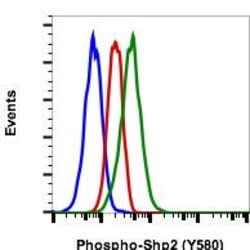Learn More
Invitrogen™ Phospho-Shp2 (Tyr580) Recombinant Rabbit Monoclonal Antibody (Shp2Y580-4A2), PE
Rabbit Recombinant Monoclonal Antibody
Supplier: Invitrogen™ MA528045
Description
Recombinant rabbit monoclonal antibodies are produced using in vitro expression systems. The expression systems are developed by cloning in the specific antibody DNA sequences from immunoreactive rabbits. Then, individual clones are screened to select the best candidates for production. The advantages of using recombinant rabbit monoclonal antibodies include: better specificity and sensitivity, lot-to-lot consistency, animal origin-free formulations, and broader immunoreactivity to diverse targets due to larger rabbit immune repertoire.
The protein encoded by this gene is a member of the protein tyrosine phosphatase (PTP) family. PTPs are known to be signaling molecules that regulate a variety of cellular processes including cell growth, differentiation, mitotic cycle, and oncogenic transformation. This PTP contains two tandem Src homology-2 domains, which function as phospho-tyrosine binding domains and mediate the interaction of this PTP with its substrates. This PTP is widely expressed in most tissues and plays a regulatory role in various cell signaling events that are important for a diversity of cell functions, such as mitogenic activation, metabolic control, transcription regulation, and cell migration. Mutations in this gene are a cause of Noonan syndrome as well as acute myeloid leukemia.
Specifications
| Phospho-Shp2 (Tyr580) | |
| Recombinant Monoclonal | |
| PE | |
| PTPN11 | |
| 2700084A17Rik; AW536184; bptp3; CFC; cSH-PTP2; encodes catalytic domain; HCP; HGNC:9644; JMML; METCDS; MGC14433; Noonan syndrome 1; ns1; null; OTTHUMP00000166108; phosphotyrosyl-protein phosphatase; protein tyrosine phosphatase non-receptor type 11; protein tyrosine phosphatase SH-PTP2; protein tyrosine phosphatase, non-receptor type 11; protein tyrosine phosphatase, non-receptor type 11 (Noonan syndrome 1); protein tyrosine phosphatase, non-receptor type 11 S homeolog; protein-tyrosine phosphatase 1D; Protein-tyrosine phosphatase 2C; protein-tyrosine phosphatase SYP; PTP1C; PTP1D; PTP-1D; ptp-2; PTP2C; PTP-2C; Ptpn11; ptpn11.S; ptpn11-a; ptpn11-b; SAP-2; SH2 domain-containing protein tyrosine phosphatase-2; Shp2; shp-2; SHPTP2; SH-PTP2; SH-PTP2 protein tyrosine phosphatase non-receptor type 11; SH-PTP2 protein tyrosine phosphatase, non-receptor type 11; SH-PTP3; Syp; Tyrosine-protein phosphatase non-receptor type 11; XELAEV_18010676mg | |
| Rabbit | |
| Protein A/G | |
| RUO | |
| 19247, 5781 | |
| 4°C | |
| Liquid |
| Flow Cytometry | |
| Shp2Y580-4A2 | |
| PBS with 0.2% BSA and 0.09% sodium azide; pH 7.4 | |
| P35235, Q06124 | |
| PTPN11 | |
| A synthetic phospho-peptide corresponding to residues surrounding Tyr580 of human phospho Shp2. | |
| 100 Tests | |
| Primary | |
| Human, Mouse | |
| Antibody | |
| IgG κ |
Your input is important to us. Please complete this form to provide feedback related to the content on this product.
